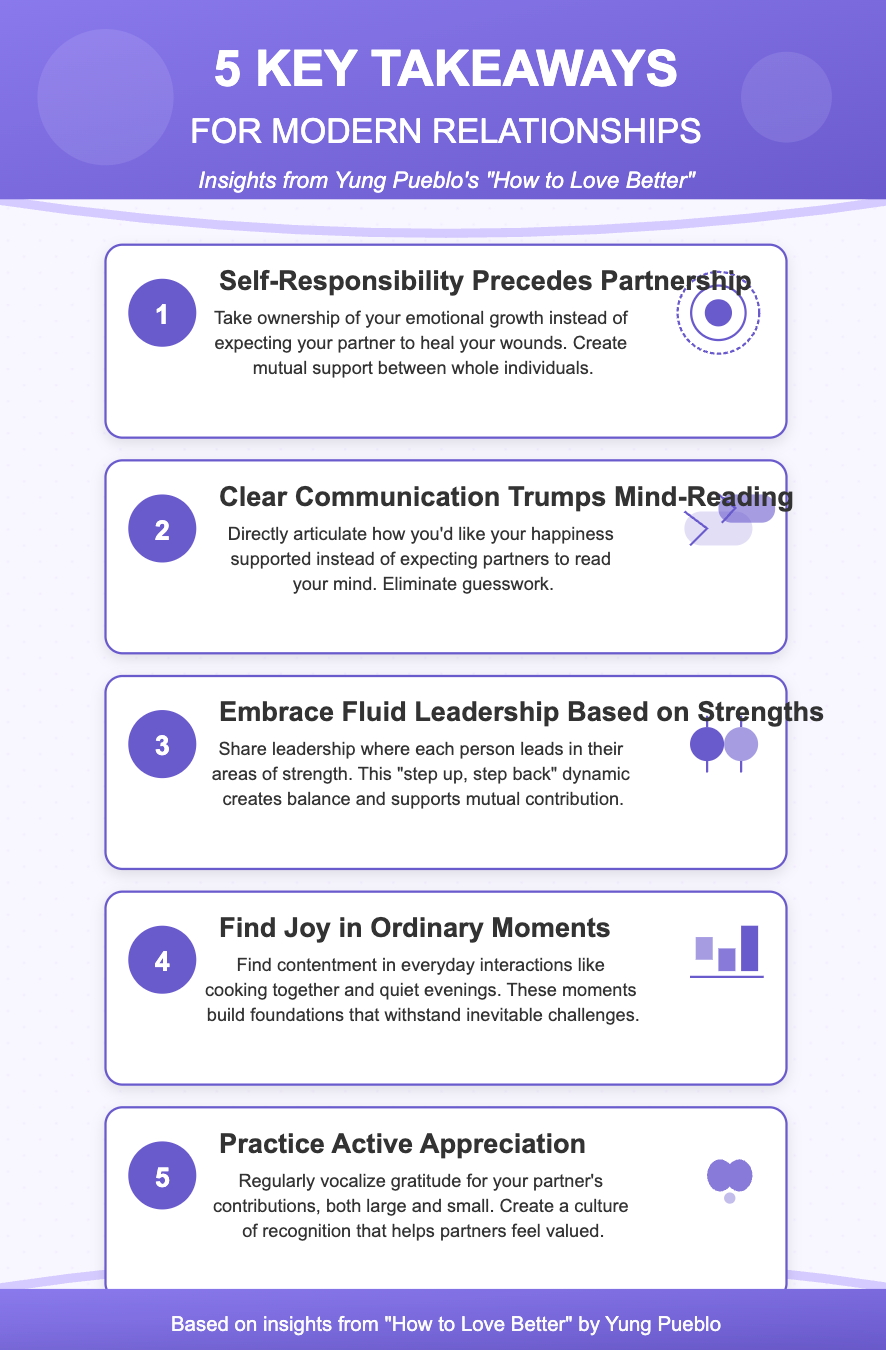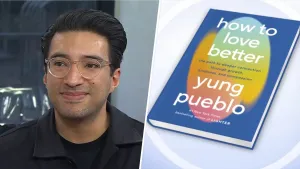Introduction
In a world of instant gratification, where dating apps promise perfect matches and social media portrays idealized relationships, we've lost sight of what truly sustains love. Diego Perez, writing as Yung Pueblo in his transformative book "How to Love Better," challenges us to rethink our approach to relationships entirely. Drawing from ancient wisdom and modern psychology, Yung Pueblo reveals that the most profound connections aren't forged through fairy tale fantasies or Hollywood-inspired romance, but through something far more revolutionary: self-awareness, personal growth, and deliberate communication. At a time when nearly half of marriages end in divorce and many more relationships collapse under unmet expectations, his message arrives like a lighthouse for those navigating the turbulent waters of modern love—offering not just hope, but a practical roadmap for creating deeper, more authentic connections.
In his profound book "How to Love Better," Diego Perez (writing as Yung Pueblo) offers wisdom on creating deeper relationships through growth, kindness, and compassion. Drawing from his extensive meditation practice and personal experience, Pueblo presents a refreshing take on love that challenges cultural myths and emphasizes self-responsibility.
The Myth of "Happily Ever After"
Our culture bombards us with dangerous relationship myths—the romantic comedy that ends after the couple overcomes one obstacle, the fairy tale promising eternal bliss after the wedding, and the idea that the right partner will magically heal all our wounds. Pueblo dismantles these narratives, showing how they set us up for disappointment.
Real relationships, he explains, involve continuous ups and downs. They consist not only of exciting moments but countless mundane interactions—doing dishes, cooking meals, taking out the trash. Rather than fighting these "boring" moments, Pueblo suggests embracing them as opportunities for connection and contentment.
Individual Growth as Relationship Foundation
A central thesis in "How to Love Better" is that healthy relationships require individual growth. As Pueblo notes in the interview about his book, "each individual arrives into a relationship with their own conditioning, with their own emotional history, with past pain that they're either aware of or not aware of, and all of that is affecting the way you show up."
Instead of expecting our partners to heal our pain or manage our emotions, Pueblo advocates for self-responsibility. When both partners commit to their own healing and growth, they create space for the relationship to flourish. This contrasts sharply with the common approach of seeking someone to "complete" us or solve our problems.
Beyond Mind-Reading: The Power of Clear Communication
One of Pueblo's most practical insights addresses our tendency to expect partners to read our minds. We often feel disappointed when partners don't anticipate our needs, leading to resentment and conflict.
"We want people to be able to read our minds," Pueblo observes, "but it feels really important to lean on communication and to just not let things be mystical and mysterious."
Rather than harboring silent expectations, Pueblo encourages openly expressing needs and desires. Simple, direct communication about how you'd like your happiness to be supported creates clarity that strengthens connection.
Shared Leadership and Complementary Strengths
Pueblo describes healthy relationships as partnerships where leadership flows naturally between people based on their respective strengths. Rather than one person dominating decision-making, couples benefit from recognizing each other's unique abilities and following each other's lead in appropriate situations.
"No one person is in charge of the relationship," he explains. "We're always making major decisions together, but there are things that she's clearly better at than I am, and I follow her leadership when it comes to those key moments. And she also follows my leadership at other times too."
This dynamic creates balance and allows both partners to contribute their best qualities to the relationship.
The Practice of Appreciation
Acknowledging your partner's contributions—both large and small—strengthens relationship bonds. Pueblo emphasizes the importance of vocalizing appreciation rather than assuming your partner knows you value them.
Regular expressions of gratitude help both partners feel seen and valued. Even simple acknowledgments of daily tasks can transform relationship dynamics by creating an atmosphere of mutual respect and recognition.
Living in Your Own Energy
During conflicts, Pueblo suggests "living in your own energy" rather than matching your partner's tension. When one person is upset, the other can maintain their peace while still being present and supportive.
"If one person has a lot of tension, we don't necessarily take that as an invitation to join them in their tension," he explains. "Instead, I'm going to sit in my peace and I'm happy to talk to you, tell me what's going on."
This approach prevents escalation and creates space for resolution.
From Self-Love to Universal Love
Perhaps most profoundly, Pueblo connects relationship growth to spiritual growth. True self-love, he argues, naturally extends beyond ourselves: "Self-love is really real when it starts opening the door to unconditional love to all beings."
By developing compassion for ourselves—recognizing our struggles and imperfections—we cultivate greater empathy for others. The work we do in our intimate relationships ripples outward, affecting all our connections.
"How to Love Better" isn't just about improving romantic relationships; it's about transforming how we connect with everyone. By committing to personal growth, communicating clearly, appreciating others, and maintaining our peace, we create the conditions for love to flourish—not just with partners, but in all areas of life.
Based on the interview transcript provided, I can identify quotes from Diego Perez (Yung Pueblo) that would make excellent SEO-friendly quotes from his book "How to Love Better." Since we only have the interview transcript rather than the full book, I'm focusing on the key relationship insights he shared during the conversation that likely reflect the book's content:
Top 20 Quotes from "How to Love Better"
- "Each individual arrives into a relationship with their own conditioning, with their own emotional history, with past pain."
- "A big part of relationship is understanding that you need to either grow or heal as an individual, and simultaneously take time to understand how your partner likes their happiness to be supported."
- "We want people to be able to read our minds, but it feels really important to lean on communication and not let things be mystical and mysterious."
- "No one person is in charge of the relationship. We're always making major decisions together."
- "Self-love is really real when it starts opening the door to unconditional love to all beings."
- "There's a mixture of highs and lows, and also a mixture of really mundane, tiny little moments in relationships."
- "To be able to have inner peace, to be able to have harmony in your relationship, all that is slow work."
- "Being able to appreciate and just vocalizing it feels nice because we know that the effort that both of us are putting in is accounted for."
- "If one person has a lot of tension, we don't necessarily take that as an invitation to join them in their tension."
- "When we have silent expectations, it reminds me of how much we love gifts, like being kids at Christmas morning."
- "We have to be proactive about learning how to care for each other."
- "We both follow each other's leadership at different times."
- "A healthy relationship can still have ups and downs."
- "We try to figure out who cares more about us moving in one direction as opposed to the other."
- "She leads us through the week and then I feel like I kind of lead us through the year."
- "What worked and helped two years ago required another conversation. It wasn't until the tension appeared that we realized something needed our attention."
- "Don't work against the universe, work with it, and part of working with it means constantly embracing change."
- "We've learned to live in our own energy."
- "Just being open about how you would like your happiness to be supported is valuable."
- "Relationship is composed of those tiny little dull moments, and there's contentment and almost access to joy in accepting them."
Conclusion
The path to loving better isn't found in grand gestures or perfect compatibility, but in the quiet, consistent work we do both within ourselves and together. When we abandon the myths of perfect romance and embrace the beautiful complexity of human connection—with all its mundane moments, challenging conversations, and opportunities for growth—we create relationships that don't just survive modern challenges but thrive because of them. By taking responsibility for our own emotional landscapes, communicating with clarity rather than expectation, and appreciating the unique dance of leading and following that each partnership develops, we transform not just our intimate relationships but our connection to humanity itself. As Yung Pueblo reminds us, true self-love naturally extends outward, opening doors to deeper compassion for all beings. In this expanding circle of awareness and care, we discover that learning to love better is not just the foundation of happy relationships—it's the very purpose of our human journey.
Summary | 5 Key Takeaways for you
Yung Pueblo's "How to Love Better" offers transformative insights for modern relationships, challenging the cultural myths that set couples up for disappointment. Drawing from Buddhist principles and personal experience, Perez provides practical wisdom for creating lasting connections in a world of quick fixes and instant gratification.

5 Key Takeaways for Modern Relationships:
- Self-Responsibility Precedes Partnership: Modern relationships flourish when both people take ownership of their emotional growth rather than expecting their partner to heal their wounds or manage their feelings. This shifts the relationship from a place of dependency to one of mutual support between whole individuals.
- Clear Communication Trumps Mind-Reading: The expectation that partners should intuitively know our needs without expression leads to resentment and conflict. In successful modern relationships, partners directly articulate how they'd like their happiness supported, eliminating the guesswork that breeds disconnection.
- Embrace Fluid Leadership Based on Strengths: Rather than rigid roles or power dynamics, thriving relationships feature shared leadership where each person leads in their areas of strength. This dance of "step up, step back" creates balance and allows both partners to contribute their best qualities.
- Find Joy in Ordinary Moments: Counter to the constant excitement portrayed in media, real relationships consist largely of mundane interactions. Modern couples who find contentment in these everyday moments—cooking together, sharing chores, quiet evenings at home—build foundations that withstand the inevitable ups and downs.
- Practice Active Appreciation: Regularly vocalizing gratitude for your partner's contributions, both large and small, strengthens relationship bonds. This simple practice counteracts the tendency toward criticism and creates a culture of recognition that helps partners feel valued and seen.
These principles offer a path to more fulfilling connections that can withstand the unique challenges of modern life, transforming relationships from sources of disappointment into opportunities for growth and genuine happiness.




